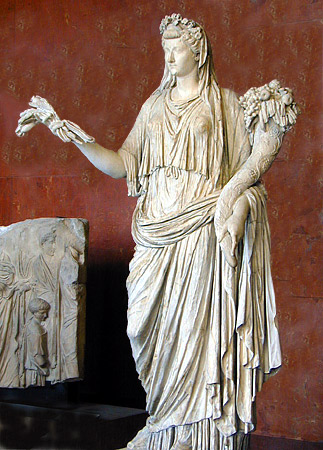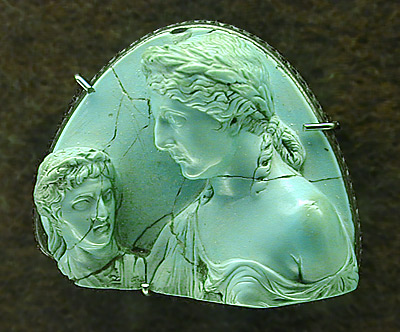 Livia as Ceres, early 1st century CE |
Claudia Semne died some time between 120-130 CE, leaving behind a freeborn son who barely survived into his majority and a most appreciative husband, Marcus Ulpius Crotonensis, a wealthy freedman of the Emperor Trajan. He memorialized his beautiful wife with an expensively decorated mausoleum situated on a huge property along the Via Appia. She is commemorated with a number of inscriptions as well as sculptured reliefs that portrayed her in the guise of the goddesses Venus, Spes, and Fortuna. Funerary sculpture which displayed women of all classes in the guise of goddesses was an imitation of the portraits, in statuary and on coins, of members of the imperial family as divinities. A common choice of goddess was Venus Genetrix, whose nude beauty bespoke fertility and productivity rather than sensuality (see this Flavian matrona portrayed as Venus). Identification with the goddess Fortuna suggested the prosperity that the woman, as matrona, contributed to her marriage through her dowry and her stewardship of her household. As Spes, the woman stood for the hoped-for continuation of the family through her offspring. In the second inscription below, Marcus Ulpius Crotonensis names his wife together with all three goddesses, praising her for her virtues outside the conventional phrases, through art and association with divinity. In one of the reliefs on the mausoleum Claudia Semne is portrayed with the artful hairstyle of the Trajanic-Hadrianic period, but dressed as is Livia in the cameo below, in a pose similar to that of Venus; in another, Semne is portrayed as a sleeping Venus. |
|
CIL 6.15592, ILS
8063a |
| Claudiae Semne coniugi dulcissimae |
| M[arcus] Ulpius Aug[usti] lib[ertus] Crotonensis |
| [hoc monumentum fecit] |
 Cameo: Empress Livia as Venus Genetrix, c. 9 BCE |
|
|
CIL 6.15593, ILS
8063c |
| Claudiae Semne uxori et |
| M[arco] Ulpio Crotonensi fil[io] |
| Crotonensis Aug[usti] lib[ertus] [hoc monumentum] fecit. |
| huic monumento cedet |
| hortus in quo tricliae, |
| viniola, puteum, aediculae |
| in quibus simulacra Claudiae |
| Semnes in formam deorum, ita uti |
| cum maceria a me circumstructa est. |
| h[oc] m[onumentum] h[eredem] n[on] s[equetur]. |
Click on the underlined words for translation aids and commentary, which will appear in a small window. Close this small window after each use.